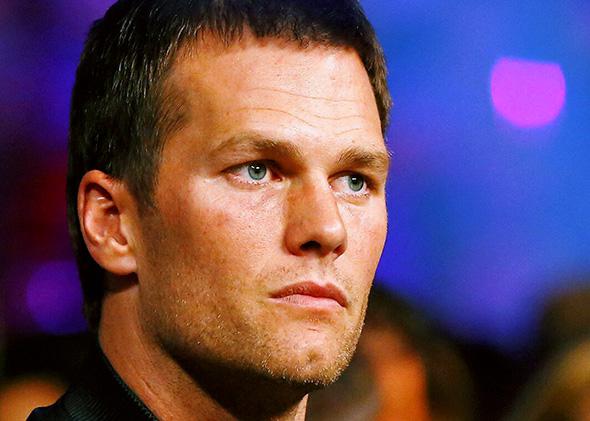On Monday, the NFL announced its punishment of Tom Brady and the New England Patriots for the so-called “deflategate” scandal. The sentence was harsh. Brady received a four-game suspension, while the Patriots were docked two draft picks, including a first-rounder, and fined $1 million for allegedly tampering with footballs before this year’s AFC Championship game. One thing is clear in the aftermath of this over-the-top discipline: NFL commissioner Roger Goodell and his kangaroo court got it wrong yet again.
Let’s leave aside the scientific inconsistencies and methodological flaws that mar the official inquiry by attorney Ted Wells into the cheating allegations. Let’s ignore the fact that little was proven here, and that the Wells Report merely asserts it’s “more probable than not” that Tom Brady was “generally aware” of purported air-pressure shenanigans. Let’s forget, for the moment, a bedrock American principle: The accused is inflated until proven wilty.
In short, let’s assume Tom Brady knew that something was being done to those balls on his behalf, and that he deserved to be penalized for this transgression. Is this punishment proportionate to the crime? No, of course not. It’s absurd. Here’s why:
The NFL’s letter outlining the penalty cited “the club’s prior record”—namely, the Spygate scandal—as a factor “in determining the discipline in this case.” Leaving aside the fact that Spygate was an overblown misdemeanor punished with unduly harsh measures, the important thing here is that the Patriots already did the time for that 2007 crime. If you recall, they forfeited a first-round pick in the 2008 draft and Bill Belichick was fined a league maximum $500,000. And the people blamed for that infraction—namely Belichick—are not even the same people being blamed for this one. Why are the Patriots as a franchise being repunished for a years-old mistake they previously made amends for, and for which the primary culprits were completely different than the current ones? If we’re going to start using teams’ past transgressions as a basis for levying present-day punishments, no team’s record is clean.
The letter also cites as a factor in the harsh punishment “the failure of Tom Brady to produce any electronic evidence, despite being offered extraordinary safeguards by the investigators to protect unrelated personal information.” Yikes. What kind of totalitarian inquisition was this? Brady answered the investigators’ questions in person. His reluctance to turn over emails and texts was perfectly reasonable—would you trust the NFL to safeguard your private communications with your friends, family, and superfamous, smokeshow wife? A football-related matter does not give the NFL broad license to poke around in a player’s personal files. Go get a warrant, NFL. Where are we meant to draw the line here? If the NFL had demanded to search Brady’s home, or to audit his financial holdings, would Brady have not been within his rights to refuse, according to Torquemada Goodell?
The league’s manual of operations actually suggests a penalty for ball alteration: “If any individual alters the footballs, or if a non-approved ball is used in the game, the person responsible and, if appropriate, the head coach or other club personnel will be subject to discipline, including but not limited to, a fine of $25,000.” To be sure, this language makes allowance for a penalty harsher than that fine. But by specifying the $25,000 figure, the manual clearly suggests a reasonable starting point. How did we get from $25,000 to $1 million, a first- and fourth-round draft pick, and a four-game suspension? The real-world penalty is wildly out of line with the suggested censure, by orders of magnitude. Why did the NFL ignore its own (however vague) guidelines?
The Atlanta Falcons were recently punished by the NFL for pumping artificial crowd noise into their stadium to gain an edge. This petty misdemeanor seems about on par with deflating footballs: Neither was likely to make much difference to a game’s final result. (As the NFL’s letter to the Pats notes, “There seems little question that the outcome of the AFC Championship Game was not affected” by the illegal deflations. The Pats won that game 45-7.) So, what was the penalty for the Falcons? A $350,000 fine, a docked fifth-round draft pick, and a suspension for a team executive. Why were the Patriots hit with such comparative severity for a crime of similar magnitude?
What’s more, the apparently grave sin of altering a game ball has not previously drawn much attention from the NFL. In 2012, the Chargers were almost certainly applying a sticky substance to footballs, and when busted they attempted to impede the investigation. The penalty? A $20,000 fine, and none of the rigamarole the Patriots organization was forced to endure. Just this season, during a game between the Vikings and the Panthers, sideline attendants were caught on televised video holding footballs in front of a heater, which—if my newly robust understanding of the ideal gas law is correct—would have produced profound changes to the air pressure within those footballs. The NFL acknowledged it was aware of this outlawed activity. Did the league dock any draft picks or levy fines and suspensions? Nope. What changed when it was the Patriots? I’m guessing it’s that the Patriots are under far greater media scrutiny, and that the Pats are easily the most envied, and thus hated, team in the league.
I’m willing to concede that Tom Brady and a couple of shmoe ballboys might have circumvented a rule about football air pressure. But I don’t see how these penalties are just. They seem outlandishly inflated.
